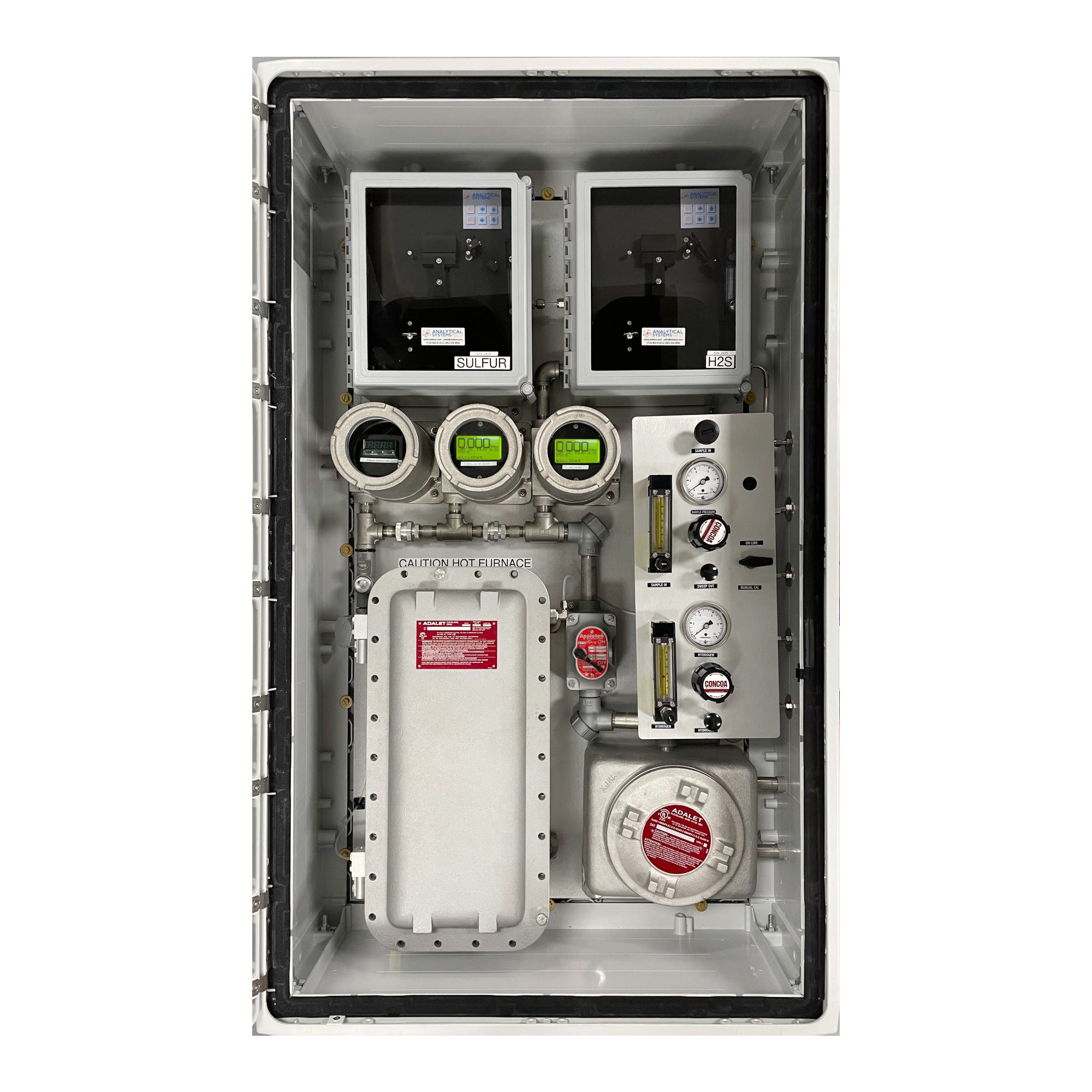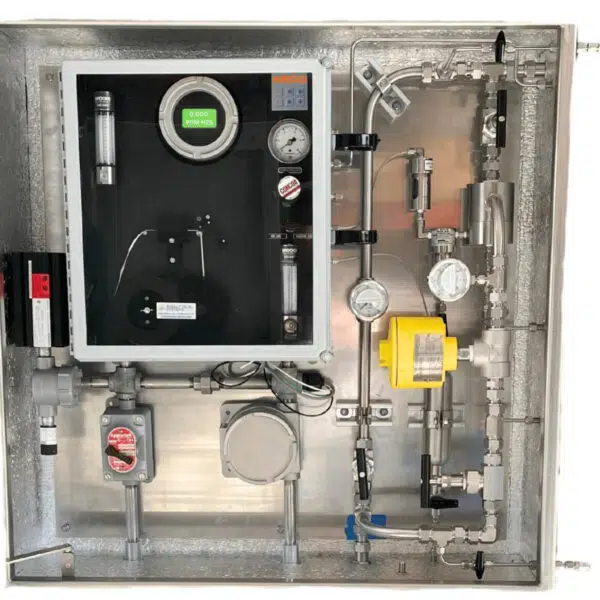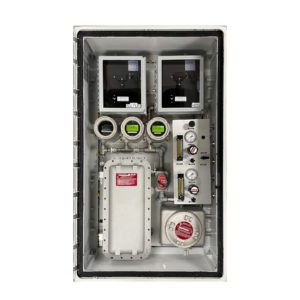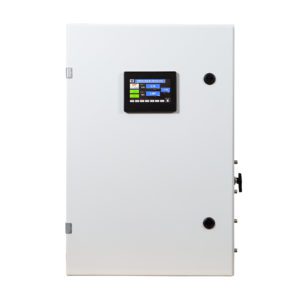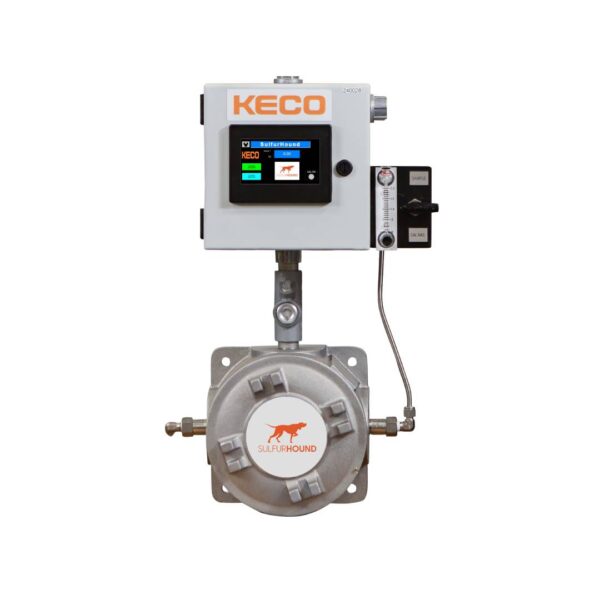Total Sulfur Analyzer
Features
Features
- Specific to Sulfur Only. No false positives, ever
- Conformity to ASTM methods
- Explosion proof for hazardous areas (Series 700)
- Automatic self-zero (no zero gas required)
- Does not suffer from sensor “zero drift”
- Fast response time
- Accurate and continuous analysis
- Quantitative measurement in PPB, PPM & percent Levels
- Proven reliability
- Automatic Calibration (optional)
- Remote & Web based monitoring/control (optional)
Description
Product Description
The petrochemical, gas processing, and gas pipeline industry has required an accurate, dependable, low maintenance, and cost-effective total sulfur analyzer for quality and process control purposes. With over twenty-five years of experience in developing and manufacturing sulfur analyzers and associated parts and supplies, KECO has met these requirements with their proven microprocessor based analyzer.
The Series 1700 (explosion proof) and Series 1600 (general purpose) systems measures total sulfur by hydrogenation similar to that as described in ASTM Method D3031, D4084-82, D4468-85 and 4045-81. The sulfur sample is precisely metered into a continuous flowing stream of hydrogen gas. The sample and hydrogen are heated in the furnace up to 1,3150 C resulting in thermal cracking of the sulfur that are reduced to short chain hydrocarbons. These reactions result in the formation of H2S.
After complete humidification of the sample, the H2S comes in direct contact with the lead acetate tape and produces a darkening of lead sulfide that is immediately measured by the photodiode/LED optics and rate-of-reaction digital electronics to provide an accurate and reproducible total sulfur analysis with PPB or PPM sensitivity up to 100%. The LCD display provides the current reading, any alarm condition, procedure prompts (i.e., calibration procedure), and failure indicators (local and remote capability). Quality materials are selected for their compatibility and utilized through fabrication. Special attention is given to wetted parts that come in contact with the process stream and are selected to be non-reactive with H2S.
The rateometric-colorimetric tape detector offered by KECO is the only total sulfur detection method that is practically free from cross-interference. The analyzer will not suffer from “false positives” like other total sulfur analyzer methods. Users demand KECO’s total sulfur analyzer due to its precision and reliability proven by thousands of worldwide installations around the globe.
Applications
Applications
Alkylation
The Alkylation processes used in production of high octane, low leaded gasolines can result in the formation of acid soluble oils due to excess sulfur content in the feed stock. This results in decreased profits. Utilizing a continuous on-line sulfur analyzer can help avoid these loses.
Sulfur in Ammonia
Sulfur compounds such as hydrogen sulfide, mercaptans, and carbonyl sulfide can react with catalytic metals and form useless oxides. A two year catalyst bed could well be destroyed in a few hours resulting in losses of over a million dollars. The continuous on-line total sulfur analyzer can prevent this disaster.
Reformers
Reformate catalysts are especially susceptible to sulfur poisoning. The newer transition metal catalysts are even more susceptible to sulfur poisoning. Grab samples sent to the lab for analysis cannot be analyzed often enough to provide adequate protection. The continuous on-line total sulfur analyzer provides fast accurate information to protect your catalyst.
Sulfur in Synthesis Gas
Many synthetic gas feed stocks contain excessive sulfur levels. These are normally hydrodesulfurized down to 100 PPB or less. Theoretically, if 100% conversion is achieved, the remaining sulfur compound is hydrogen sulfide. Depending on the efficiency of the hydrodesulfurization process other sulfur compounds such as carbon disulfide, carbonyl sulfide, and thiophenes could be present. These sulfurs could result in catalyst life being reduced to hours instead of years. The continuous on-line total sulfur analyzer can provide analysis for monitoring your catalyst.
Frequently Asked Questions
Frequently Asked Questions
What is a total sulfur analyzer?
A total sulfur analyzer quantifies all species of sulfurs in a given sample stream continuously, in real-time. Total sulfur analyzers are used in the oil & gas industry at refineries and chemical plants. Total sulfur analyzers are also used at biogas plants to detect impurities in the gas (such as methane).
How do total sulfur analyzers work?
The most accurate and cost-effective way to measure total sulfur is with a total sulfur analyzer that uses lead-acetate tape and a combustion furnace. Total sulfur analyzers work by combusting pure hydrogen with heat to create H2S. The H2S is then quantified as total sulfur using a lead-acetate H2S analyzer.
How much does a total sulfur analyzer cost?
The cost of a total sulfur analyzer ranges widely based on what options are required such as hazardous area ratings, communications requirements, and other aspects.
Can you install a total sulfur analyzer outside?
Yes, total sulfur analyzers are typically designed to be installed in outside locations and are equipped with weather-resistant packaging.

